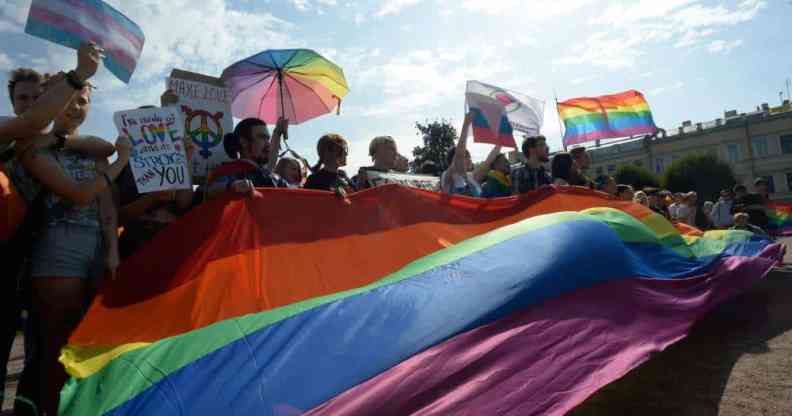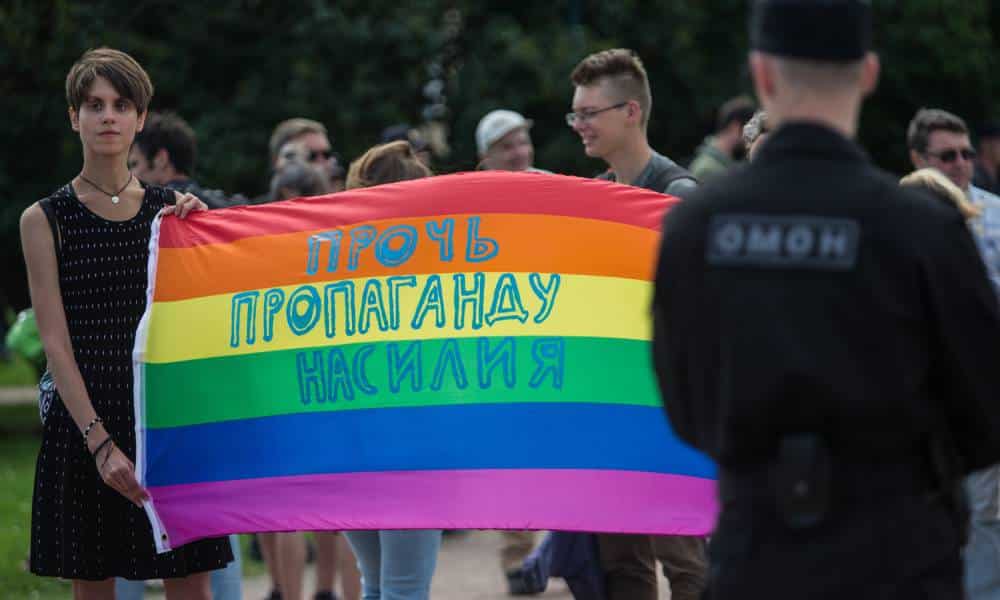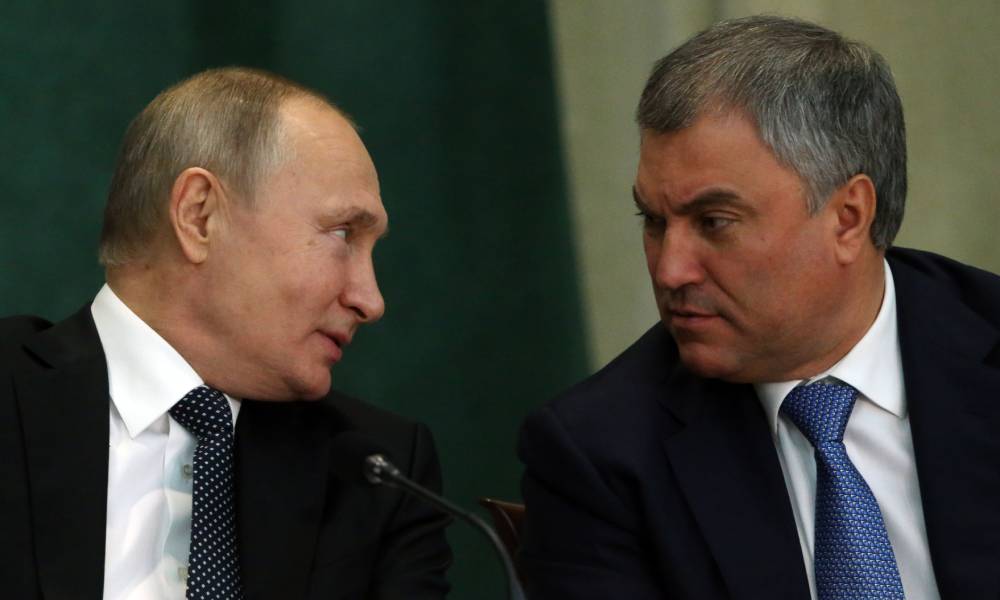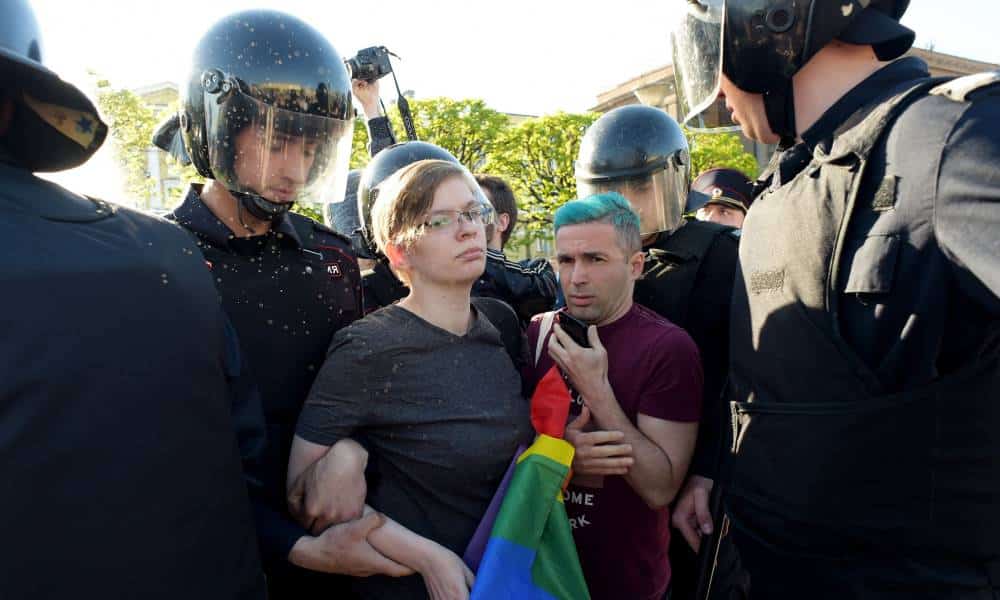Activists warn Russia expanding ‘gay propaganda’ law signals ‘heartbreaking’ turn on LGBTQ+ rights

Activists say Russian politicians’ attempts to expand ‘gay propaganda’ laws and bills to erase LGBTQ+ media have a devastating impact on queer people in Russia. (Olga Maltseva/AFP via Getty)
Attempts to expand Russia’s ‘gay propaganda’ ban to adults signal a worsened crackdown on queer rights in the country, activists have warned.
The notorious ‘gay propaganda’ law, passed in 2013, criminalises the sharing of LGBTQ-inclusive content with young people.
Those who violate the law can face a hefty fine of up to 1 million rubles (£15,182) or up to 15 days in jail.
Lawmakers have tried in recent months, so far unsuccessfully, to expand the ‘gay propaganda’ ban. This push has taken on many forms, including a recent draft bill that would ban depictions of the LGBTQ+ community for “audiences of all ages” in the media and online.
Politicians introduced a bill on Monday (18 July) in the lower house of the Duma – one of the chambers of the Russian parliament – that would classify all media content “that denies family values” or promotes “non-traditional sexual relations” as “propaganda”, the Moscow Times reported. This would include everything from films and TV shows to online content and more.
The bill, which wasn’t a direct expansion of the existing ‘gay propaganda’ law, claimed the so-called promotion of LGBTQ+ relationships and child-free lifestyles are as dangerous for Russian society as propaganda about drugs, suicide and extremism.
Aleksandr Voronov, CEO of LGBTQ+ group Coming Out, told PinkNews that the bill was “another repressive law of pressure on the media”.
He explained that content that included LGBTQ+ topics could be “accused of [being] propaganda to minors, even if there was an 18+ marking”, and even if it was presented in a “neutral” way.
“If these amendments are adopted, the life of LGBT+ people in Russia will also become even more difficult, because there will be less representation in the media and social networks,” Voronov said. “This is an additional repressive lever for an already anti-humane system”.

The existing ‘gay propaganda’ law has been used by Russian authorities to crack down on LGBTQ+ activists. (Igor Russak/SOPA Images/LightRocket via Getty)Despite these attempts to erase the LGBTQ+ community, Voronov vowed that queer activism will “continue to exist in Russia”. He described how Coming Out conducts some of its work on Instagram, which is “blocked on the territory of the Russian Federation”.
Gay propaganda bill likely to fail – but more crackdowns are inevitable
Duma will vote on the bill in September, after its holiday.
It seems unlikely that it will gain traction, as Vladimir Putin’s United Russia party doesn’t support the legislation, according to reports on Vedomosti.
However, Dilya Gafurova, head of Russian LGBTQ+ charitable foundation Sphere, told PinkNews: “There’s different bills suggested every month now on LGBT+ propaganda so I’m actually expecting something in August, and then I’m expecting for something to be voted in September.”
She explained that various political parties in Russia have suggested measures to restrict how information about the LGBTQ+ community can be spread.
So far, they’ve all been declined, but Gafurova says politicians en masse clearly want to expand the LGBTQ+ propaganda measure, and it is now a “question of who wins the bid”.
She believes “heavy hitter” Vyacheslav Volodin – the parliament’s speaker, a close ally to Putin and influential member of the ruling United Russia – could get such measures passed if he were to introduce them later this year.
Volodin has already proposed expanding the ‘gay propaganda’ law.

Duma speaker Vyacheslav Volodin (R), an ally of Vladimir Putin (L), voiced support for legislation expanding ‘gay propaganda’ laws. (Getty/Mikhail Svetlov)
He spoke in favour of banning the promotion of “non-traditional values”, said calls to legalise same-sex marriage in Russia are a “thing of the past” and claimed “attempts to impose alien values” on Russian society “have failed”.
Gafurova said Sphere is still “fighting this whole thing” despite backlash from the government. But, she said, it is all “very confusing to people” due to “no real understanding” written in law about what LGBTQ+ propaganda really is.
“It’s all coupled up very nicely with Russian official rhetoric of traditional values and how Russia exists in juxtaposition to western values,” Gafurova said. “The Russian government was using this law arbitrarily, mostly to curb activism.”
She continued: “When LGBT+ activists took to the streets or they tried to launch information campaigns through their platforms, they would either get fined or their resources would get blocked as well.”
Sphere’s legal entity was dissolved by a Russian court after a request by the Ministry of Justice in April.
Gay propaganda law being used to clamp down on activists
There have been reports the existing ‘gay propaganda’ law has been used by authorities as a way to clamp down on LGBTQ+ advocates, prevent young people from accessing inclusive media and ban LGBTQ-themed content on streaming platforms aimed at kids.

Russian riot police detained gay rights activists during World Day Against Homophobia and Transophobia in Saint Petersburg on 17 May 2019. (Olga Maltseva/AFP via Getty)
Gafurova told PinkNews the legislative attacks have had a devastating impact on LGBTQ+ people living in Russia, forcing people to “live in fear” because “they’re forever being denied their identity and their rights”.
“It’s heartbreaking to see people are portrayed to be a product of any kind of influence,” Gafurova said. “This is about their identity, who they are and this has been denied to them.”
She added: “They’re being forever erased as a part of society as a social group and a vulnerable one at that.
“There are LGBT+ families in Russia who are afraid that their children will be taken away.
“There are people who are trans who are now lacking access to hormone therapy because of the sanctions, and they cannot speak up openly.”
Though the erasure of LGBTQ+ people has been “going on for the years in many regions of Russia”, she said it is still vastly upsetting to see it continue with support from so many politicians.
She added that many people feel they can’t leave Russia because of family ties, jobs, foreign language skills and a rise in anger towards Russian people abroad due to the war in Ukraine.

